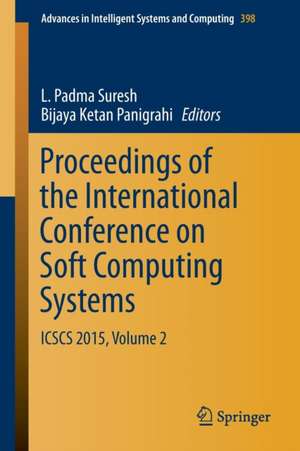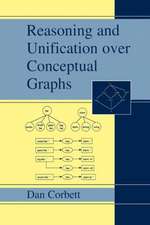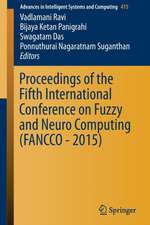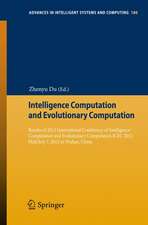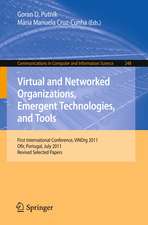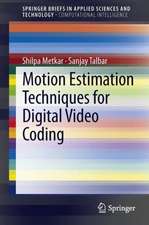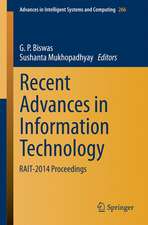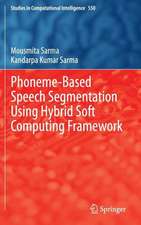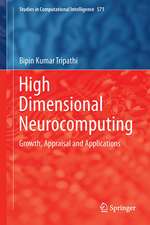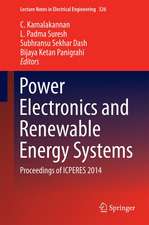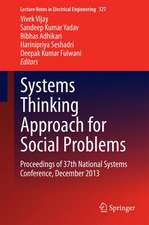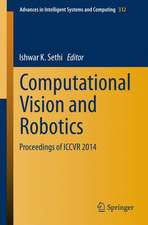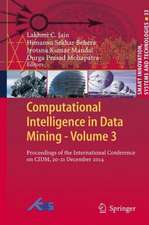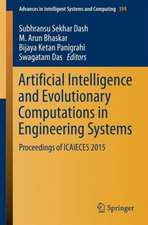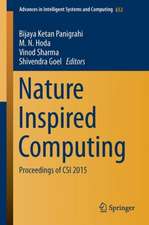Proceedings of the International Conference on Soft Computing Systems: ICSCS 2015, Volume 2: Advances in Intelligent Systems and Computing, cartea 398
Editat de L. Padma Suresh, Bijaya Ketan Panigrahien Limba Engleză Paperback – 8 dec 2015
| Toate formatele și edițiile | Preț | Express |
|---|---|---|
| Paperback (2) | 1294.36 lei 6-8 săpt. | |
| Springer India – 8 dec 2015 | 1294.36 lei 6-8 săpt. | |
| Springer India – 29 dec 2015 | 1308.08 lei 6-8 săpt. |
Din seria Advances in Intelligent Systems and Computing
- 70%
 Preț: 395.69 lei
Preț: 395.69 lei - 20%
 Preț: 1090.59 lei
Preț: 1090.59 lei - 20%
 Preț: 1324.07 lei
Preț: 1324.07 lei - 20%
 Preț: 758.57 lei
Preț: 758.57 lei - 20%
 Preț: 1989.79 lei
Preț: 1989.79 lei - 20%
 Preț: 1946.92 lei
Preț: 1946.92 lei - 18%
 Preț: 1273.28 lei
Preț: 1273.28 lei - 20%
 Preț: 2264.51 lei
Preț: 2264.51 lei - 20%
 Preț: 1337.27 lei
Preț: 1337.27 lei - 20%
 Preț: 1297.67 lei
Preț: 1297.67 lei - 20%
 Preț: 1315.82 lei
Preț: 1315.82 lei - 20%
 Preț: 1310.88 lei
Preț: 1310.88 lei - 20%
 Preț: 1302.62 lei
Preț: 1302.62 lei - 20%
 Preț: 882.19 lei
Preț: 882.19 lei - 20%
 Preț: 1305.93 lei
Preț: 1305.93 lei - 20%
 Preț: 1629.32 lei
Preț: 1629.32 lei - 20%
 Preț: 1345.49 lei
Preț: 1345.49 lei - 18%
 Preț: 1227.52 lei
Preț: 1227.52 lei - 18%
 Preț: 1290.64 lei
Preț: 1290.64 lei - 20%
 Preț: 1041.10 lei
Preț: 1041.10 lei - 20%
 Preț: 1034.52 lei
Preț: 1034.52 lei - 20%
 Preț: 1298.50 lei
Preț: 1298.50 lei - 20%
 Preț: 1330.67 lei
Preț: 1330.67 lei - 20%
 Preț: 1483.28 lei
Preț: 1483.28 lei - 20%
 Preț: 1971.64 lei
Preț: 1971.64 lei - 20%
 Preț: 1006.48 lei
Preț: 1006.48 lei - 20%
 Preț: 1471.75 lei
Preț: 1471.75 lei - 20%
 Preț: 1471.56 lei
Preț: 1471.56 lei - 20%
 Preț: 1454.40 lei
Preț: 1454.40 lei - 20%
 Preț: 1494.84 lei
Preț: 1494.84 lei - 20%
 Preț: 1269.64 lei
Preț: 1269.64 lei - 20%
 Preț: 1481.64 lei
Preț: 1481.64 lei - 20%
 Preț: 1192.08 lei
Preț: 1192.08 lei - 20%
 Preț: 1298.50 lei
Preț: 1298.50 lei - 20%
 Preț: 1489.07 lei
Preț: 1489.07 lei - 20%
 Preț: 825.78 lei
Preț: 825.78 lei - 20%
 Preț: 1649.93 lei
Preț: 1649.93 lei - 20%
 Preț: 1463.49 lei
Preț: 1463.49 lei - 20%
 Preț: 1268.80 lei
Preț: 1268.80 lei - 20%
 Preț: 1474.22 lei
Preț: 1474.22 lei - 20%
 Preț: 1298.50 lei
Preț: 1298.50 lei - 20%
 Preț: 1327.35 lei
Preț: 1327.35 lei - 20%
 Preț: 1973.31 lei
Preț: 1973.31 lei - 18%
 Preț: 947.04 lei
Preț: 947.04 lei - 18%
 Preț: 1441.39 lei
Preț: 1441.39 lei -
 Preț: 503.54 lei
Preț: 503.54 lei - 20%
 Preț: 638.55 lei
Preț: 638.55 lei - 20%
 Preț: 1320.76 lei
Preț: 1320.76 lei
Preț: 1294.36 lei
Preț vechi: 1617.95 lei
-20% Nou
Puncte Express: 1942
Preț estimativ în valută:
247.79€ • 254.97$ • 208.87£
247.79€ • 254.97$ • 208.87£
Carte tipărită la comandă
Livrare economică 01-15 martie
Preluare comenzi: 021 569.72.76
Specificații
ISBN-13: 9788132226727
ISBN-10: 8132226720
Pagini: 800
Ilustrații: XV, 743 p. 343 illus. in color.
Dimensiuni: 155 x 235 x 38 mm
Greutate: 1.04 kg
Ediția:1st ed. 2016
Editura: Springer India
Colecția Springer
Seria Advances in Intelligent Systems and Computing
Locul publicării:New Delhi, India
ISBN-10: 8132226720
Pagini: 800
Ilustrații: XV, 743 p. 343 illus. in color.
Dimensiuni: 155 x 235 x 38 mm
Greutate: 1.04 kg
Ediția:1st ed. 2016
Editura: Springer India
Colecția Springer
Seria Advances in Intelligent Systems and Computing
Locul publicării:New Delhi, India
Public țintă
ResearchCuprins
Chapter 1. A Hybrid Ant Colony Tabu Search Algorithm for Solving Task Assignment Problem in Heterogeneous Processors.- Chapter 2. Study of Chunking Algorithm in Data De-Duplication.- Chapter 3. Secured Key Sharing in Cloud Storage Using Elliptic Curve Cryptography.- Chapter 4. Designing a Customized Testing Tool for Windows Phones Utilizing Background Agents.- Chapter 5. Real-time Remote Monitoring of Human Vital Signs Using Internet of Things (IoT) and GSM Connectivity.- Chapter 6. Task Scheduling Using Multi-Objective Particle Swarm Optimization with Hamming Inertia Weight.- Chapter 7. Pedagogue: A Model for Improving Core Competency Level in Placement Interviews through Interactive Android Application.- Chapter 8. Non-functional QoS Criterion Based Web Service Ranking.- Chapter 9. Experimental Study on Chunking Algorithms of Data De-Duplication System on Large Scale Data.- Chapter 10. A Systematic Review of Security Measures for Web Browser Extension Vulnerabilities.- Chapter 11. Facial Expression Recognition Using PCA and Texture Based LDN Descriptor.- Chapter 12. Role Based Access Control for Encrypted Data Using Vector Decomposition.- Chapter 13. Mobile Controlled Door Locking System with Two-factor Authentication.- Chapter 14. Integration of UMTS With WLAN Using Intermediate IMS Network.- Chapte
r 15. Building a Knowledge Vault with Effective Data Processing and Storage.- Chapter 16. Comparative Performance Analysis of Microstrip Patch Antenna at 2.4 GHz and 18 GHz Using AN-SOF Professional.- Chapter 17. A Study on Security Issues in Cloud Computing.- Chapter 18. An Analysis of Black-Box Web Application Vulnerability Scanners in SQLi Detection.- Chapter 19. Search Optimisation in Cloud.- Chapter 20. Correlated Analysis of Morphological Patterns Between SD-OCT and FFA Imaging for Diabetic Maculopathy Detection: Conformal Mapping Based Approach.- Chapter 21. Advanced Cluster Based Attribute Slicing: A New Approach for Privacy Preservation.- Chapter 22. Advanced Power Demand Controller and Billing System Using GSM.- Chapter 23. A Study on Segmentation Based Copy-Move Forgery Detection Using Daisy Descriptor.- Chapter 24. FSM Based VLSI Architecture for the 3x3 Window based DBUTMPF Algorithm.- Chapter 25. Detection and Segmentation of Cluttered Objects from Texture Cluttered Scene.- Chapter 26. Enhanced Automatic Classification of Epilepsy Diagnosis Using ICD9 and SNOMED-CT.- Chapter 27. Scalable Casual Data Consistency for Wide Area Storage with Cloud.- Chapter 28. An Enhanced Tourism Recommendation System with Relevancy Feedback Mechanism and Ontological Specifications.- Chapter 29. Big Data and Analytics – A Journey Through Basic Concepts to Research Issues.- Chapter 30. Efficient Identification of Bots by K-Means Clustering.- Chapter 32. Timely Prediction of Road Traffic Congestion Using Ontology.- Chapter 33. Optimal Selection of Security Countermeasures for Effective Information Security.- Chapter 34. Stabilization of Load in Content Delivery Networks.- Chapter 35. Eigen Based Indexing and Retrieval of Similar Videos.- Chapter 36. FoetusCare: An Android App for Pregnancy Care.- Chapter 37. Mobile Forensic Investigation (MFI) Life Cycle Process for Digital Data Discovery (DDD).- Chapter 38. MIMO Based Efficient Data Transmission Using USRP.- Chapter 39. Automatic Road Sign Detection and Recognition Based on Sift Feature Matching Algorithm.- Chapter 40. A Performance Analysis of Black-Hole Detection Mechanisms in Ad-hoc Networks.- Chapter 41. Sensor Web Enablement for an Indoor Pervasive Network Using RESTful Architecture.- Chapter 42. Bio-Sensor Authentication for Medical Applications Using WBAN.- Chapter 43. PSO Based Multipath Routing in Wireless Sensor Network.- Chapter 44. Information Hiding in H.264, H.265 and MJPEG.- Chapter 45. Intelligent Data Prediction System Using Data Mining and Neural Networks.- Chapter 46. Resource Allocation for Wireless Network Environment.- Chapter 47. Design of PSO Based PI controller for Tension Control in Web Transport Systems.- Chapter 48. Distributed Service Level Agreement Driven Dynamic Cloud Resource Management.- Chapter 49. Efficient Route Discovery in VANET Using Binary Bat Approach.- Chapter 50. Mining Ambiguities Using Pixel-based Content Extraction.- Chapter 51. Intelligent Collision Avoidance Approach in VANET Using Artificial Bee Colony Algorithm.- Chapter 52. Enhancing the Interactivity in Distributed Interactive Applications.- Chapter 53. Comparison and Analysis of Fuzzy Methods -TOPSIS, CORPAS-G, ANP, ELECTRE AND AHP Using Matlab.- Chapter 54. Enhanced and Secure Query Services in Cloud with Perfect Data Privacy for the Data Owner.- Chapter 55. Forecasting the Stability of the Data Centre Based on Real Time Data of Batch Workload Using Times Series Models.- Chapter 56. Active Warden Attack on Steganography Using Prewitt Filter.- Chapter 57. Similarity Scores Evaluation in Social Networking Sites.- Chapter 58. Estimating Random Delays in Modbus over TCP/IP network Using Experiments and General Linear Regression Neural Networks with Genetic Algorithm Smoothing.- Chapter 59. Opinion Mining of User Reviews Using Machine Learning Techniques and Ranking of Products Based on Features.- Chapter 60. Identification of Attacks Using Proficient Data Interested Decision Tree Algorithm in Data mining.- Chapter 61. NEBULA: Deployment of Cloud Using Open source.- Chapter 62. An Efficient Task Scheduling Scheme in Cloud Computing Using Graph Theory.- Chapter 63. A Stochastic Modelling Approach for the Performance Analysis of an Intrusion Detection System.- Chapter 64. Towards Modelling a Trusted and Secured Centralised Reputation System for VANET’s.- Chapter 65. A Surveyon Trusted Platform Module For Data Remanence in Cloud.- Chapter 66. Multimodal Fuzzy Ontology Creation and Knowledge Information Retrieval.- Chapter 67. A Hybrid Cloud Architecture for Secure Service –Measures Against Poodle Vulnerability.- Chapter 68. An Efficient Authentication System for Data Forwarding Under Cloud Environment.- Chapter 69. Survey on Data Mining Techniques with Data Structures.
r 15. Building a Knowledge Vault with Effective Data Processing and Storage.- Chapter 16. Comparative Performance Analysis of Microstrip Patch Antenna at 2.4 GHz and 18 GHz Using AN-SOF Professional.- Chapter 17. A Study on Security Issues in Cloud Computing.- Chapter 18. An Analysis of Black-Box Web Application Vulnerability Scanners in SQLi Detection.- Chapter 19. Search Optimisation in Cloud.- Chapter 20. Correlated Analysis of Morphological Patterns Between SD-OCT and FFA Imaging for Diabetic Maculopathy Detection: Conformal Mapping Based Approach.- Chapter 21. Advanced Cluster Based Attribute Slicing: A New Approach for Privacy Preservation.- Chapter 22. Advanced Power Demand Controller and Billing System Using GSM.- Chapter 23. A Study on Segmentation Based Copy-Move Forgery Detection Using Daisy Descriptor.- Chapter 24. FSM Based VLSI Architecture for the 3x3 Window based DBUTMPF Algorithm.- Chapter 25. Detection and Segmentation of Cluttered Objects from Texture Cluttered Scene.- Chapter 26. Enhanced Automatic Classification of Epilepsy Diagnosis Using ICD9 and SNOMED-CT.- Chapter 27. Scalable Casual Data Consistency for Wide Area Storage with Cloud.- Chapter 28. An Enhanced Tourism Recommendation System with Relevancy Feedback Mechanism and Ontological Specifications.- Chapter 29. Big Data and Analytics – A Journey Through Basic Concepts to Research Issues.- Chapter 30. Efficient Identification of Bots by K-Means Clustering.- Chapter 32. Timely Prediction of Road Traffic Congestion Using Ontology.- Chapter 33. Optimal Selection of Security Countermeasures for Effective Information Security.- Chapter 34. Stabilization of Load in Content Delivery Networks.- Chapter 35. Eigen Based Indexing and Retrieval of Similar Videos.- Chapter 36. FoetusCare: An Android App for Pregnancy Care.- Chapter 37. Mobile Forensic Investigation (MFI) Life Cycle Process for Digital Data Discovery (DDD).- Chapter 38. MIMO Based Efficient Data Transmission Using USRP.- Chapter 39. Automatic Road Sign Detection and Recognition Based on Sift Feature Matching Algorithm.- Chapter 40. A Performance Analysis of Black-Hole Detection Mechanisms in Ad-hoc Networks.- Chapter 41. Sensor Web Enablement for an Indoor Pervasive Network Using RESTful Architecture.- Chapter 42. Bio-Sensor Authentication for Medical Applications Using WBAN.- Chapter 43. PSO Based Multipath Routing in Wireless Sensor Network.- Chapter 44. Information Hiding in H.264, H.265 and MJPEG.- Chapter 45. Intelligent Data Prediction System Using Data Mining and Neural Networks.- Chapter 46. Resource Allocation for Wireless Network Environment.- Chapter 47. Design of PSO Based PI controller for Tension Control in Web Transport Systems.- Chapter 48. Distributed Service Level Agreement Driven Dynamic Cloud Resource Management.- Chapter 49. Efficient Route Discovery in VANET Using Binary Bat Approach.- Chapter 50. Mining Ambiguities Using Pixel-based Content Extraction.- Chapter 51. Intelligent Collision Avoidance Approach in VANET Using Artificial Bee Colony Algorithm.- Chapter 52. Enhancing the Interactivity in Distributed Interactive Applications.- Chapter 53. Comparison and Analysis of Fuzzy Methods -TOPSIS, CORPAS-G, ANP, ELECTRE AND AHP Using Matlab.- Chapter 54. Enhanced and Secure Query Services in Cloud with Perfect Data Privacy for the Data Owner.- Chapter 55. Forecasting the Stability of the Data Centre Based on Real Time Data of Batch Workload Using Times Series Models.- Chapter 56. Active Warden Attack on Steganography Using Prewitt Filter.- Chapter 57. Similarity Scores Evaluation in Social Networking Sites.- Chapter 58. Estimating Random Delays in Modbus over TCP/IP network Using Experiments and General Linear Regression Neural Networks with Genetic Algorithm Smoothing.- Chapter 59. Opinion Mining of User Reviews Using Machine Learning Techniques and Ranking of Products Based on Features.- Chapter 60. Identification of Attacks Using Proficient Data Interested Decision Tree Algorithm in Data mining.- Chapter 61. NEBULA: Deployment of Cloud Using Open source.- Chapter 62. An Efficient Task Scheduling Scheme in Cloud Computing Using Graph Theory.- Chapter 63. A Stochastic Modelling Approach for the Performance Analysis of an Intrusion Detection System.- Chapter 64. Towards Modelling a Trusted and Secured Centralised Reputation System for VANET’s.- Chapter 65. A Surveyon Trusted Platform Module For Data Remanence in Cloud.- Chapter 66. Multimodal Fuzzy Ontology Creation and Knowledge Information Retrieval.- Chapter 67. A Hybrid Cloud Architecture for Secure Service –Measures Against Poodle Vulnerability.- Chapter 68. An Efficient Authentication System for Data Forwarding Under Cloud Environment.- Chapter 69. Survey on Data Mining Techniques with Data Structures.
Notă biografică
Dr. L. Padma Suresh obtained his doctorate from M S University and Dr. M.G.R University, respectively. He is presently working as a Professor and Head in Department of Electrical and Electronics Engineering, Noorul Islam University, Kumaracoil, India. Dr. Suresh is well known for his contributions to the field in both research and education contributing over 50 research articles in journal and conferences. He is the editorial member of International Journal of Advanced Electrical and Computer Engineering and also served as reviewer for various reputed journals. He has been a life member of the Indian Society for Technical Education. He also served in many committees as Convener, Chair, and Advisory member for various external agencies. His research is currently focused on Artificial Intelligence, Power Electronics, Evolutionary Algorithms, Image Processing, and Control Systems.
Dr. Bijaya Ketan Panigrahi is an Associate Professor of Electrical and Electronics Engineering Department in Indian Institute of Technology Delhi, India. He received his Ph.D. degree from Sambalpur University. He is serving as a chief editor to the International Journal of Power and Energy Conversion. His interests focus on Power Quality, FACTS Devices, Power System Protection, and AI Application to Power System.
Dr. Bijaya Ketan Panigrahi is an Associate Professor of Electrical and Electronics Engineering Department in Indian Institute of Technology Delhi, India. He received his Ph.D. degree from Sambalpur University. He is serving as a chief editor to the International Journal of Power and Energy Conversion. His interests focus on Power Quality, FACTS Devices, Power System Protection, and AI Application to Power System.
Textul de pe ultima copertă
The book is a collection of high-quality peer-reviewed research papers presented in International Conference on Soft Computing Systems (ICSCS 2015) held at Noorul Islam Centre for Higher Education, Chennai, India. These research papers provide the latest developments in the emerging areas of Soft Computing in Engineering and Technology. The book is organized in two volumes and discusses a wide variety of industrial, engineering and scientific applications of the emerging techniques. It presents invited papers from the inventors/originators of new applications and advanced technologies.
Caracteristici
Discusses a wide variety of industrial, engineering and scientific applications of the emerging techniques Provides a collection of high-quality peer-reviewed research papers Presents invited papers from the inventors/originators of new applications and advanced technologies Includes supplementary material: sn.pub/extras
